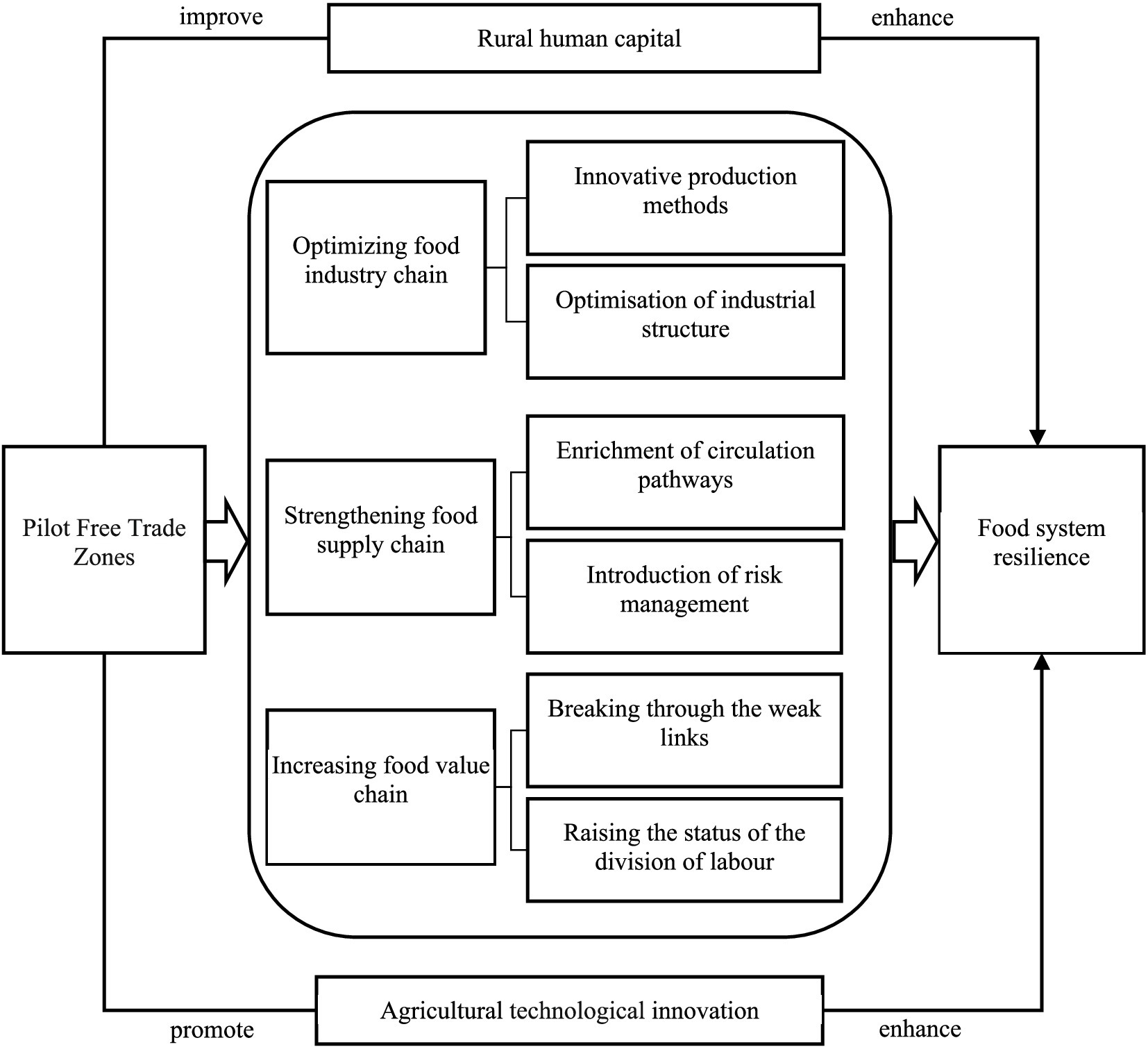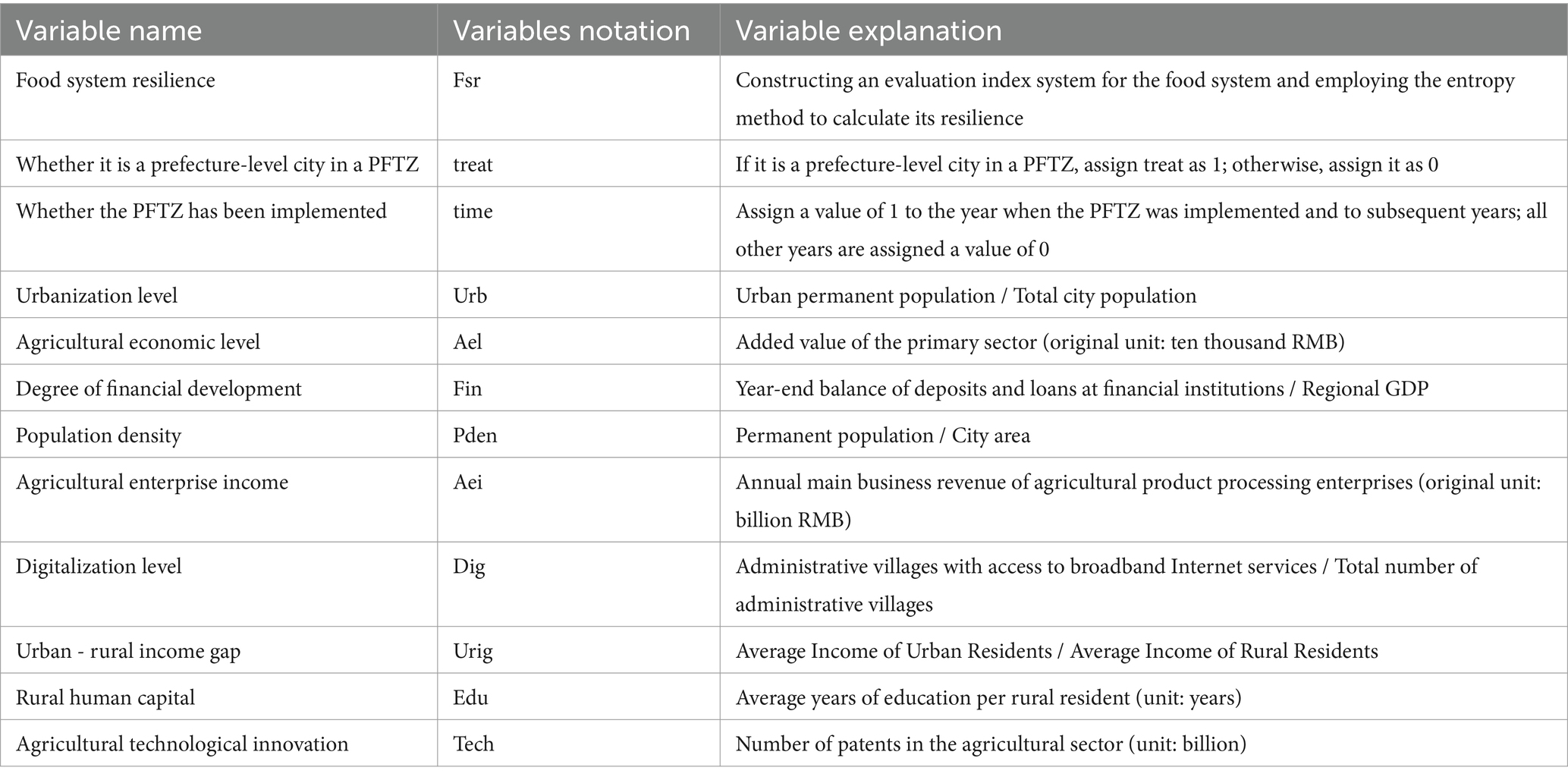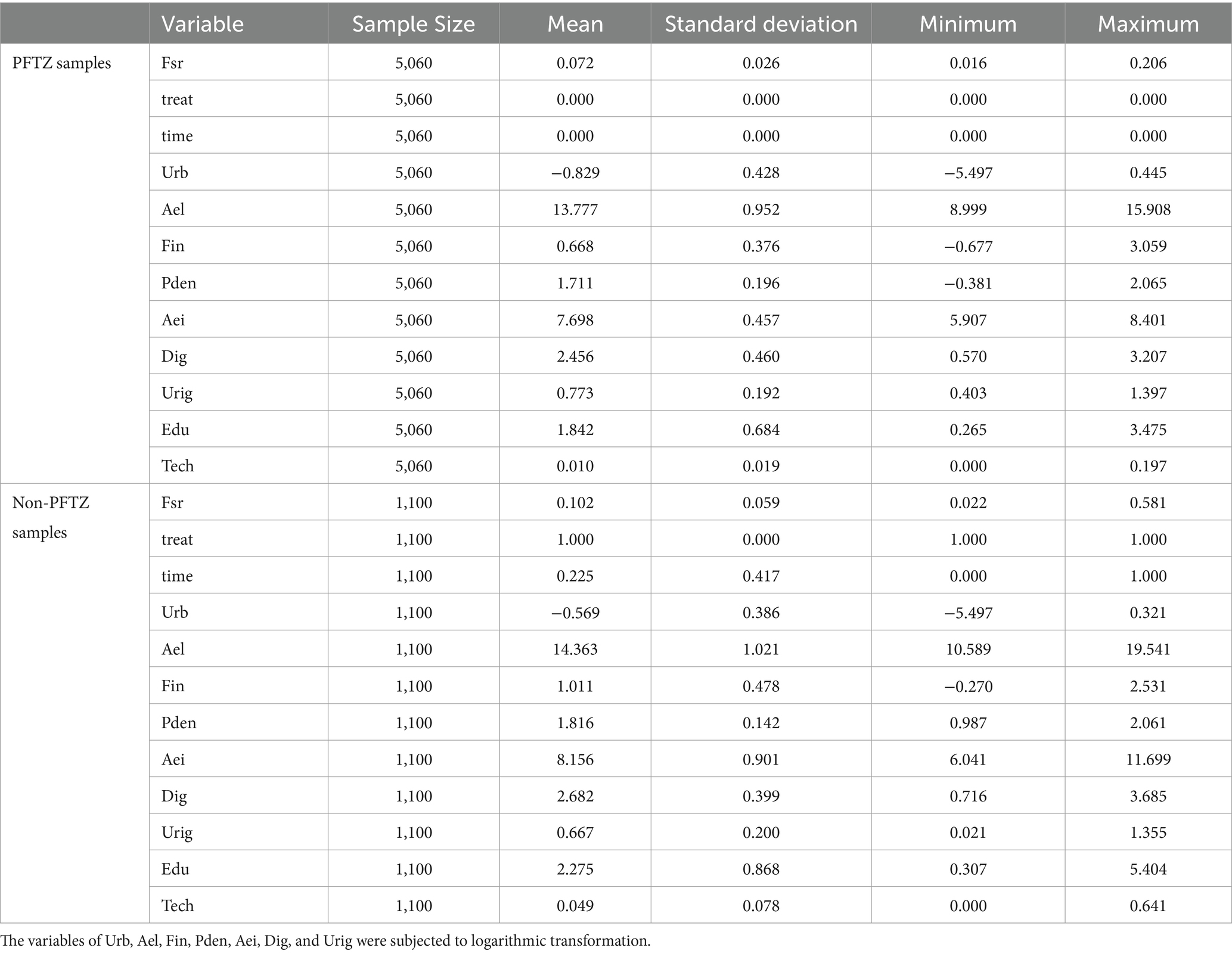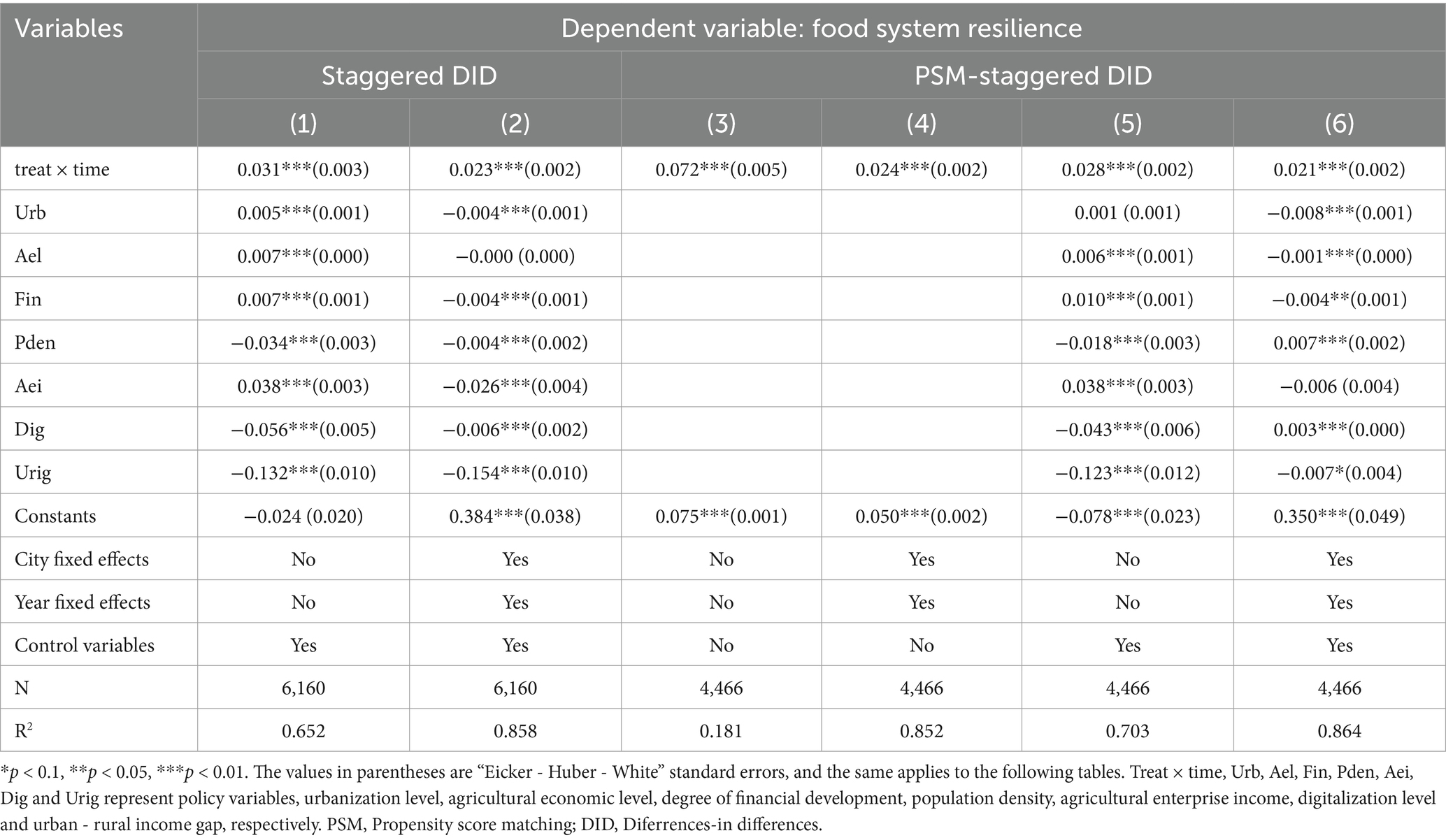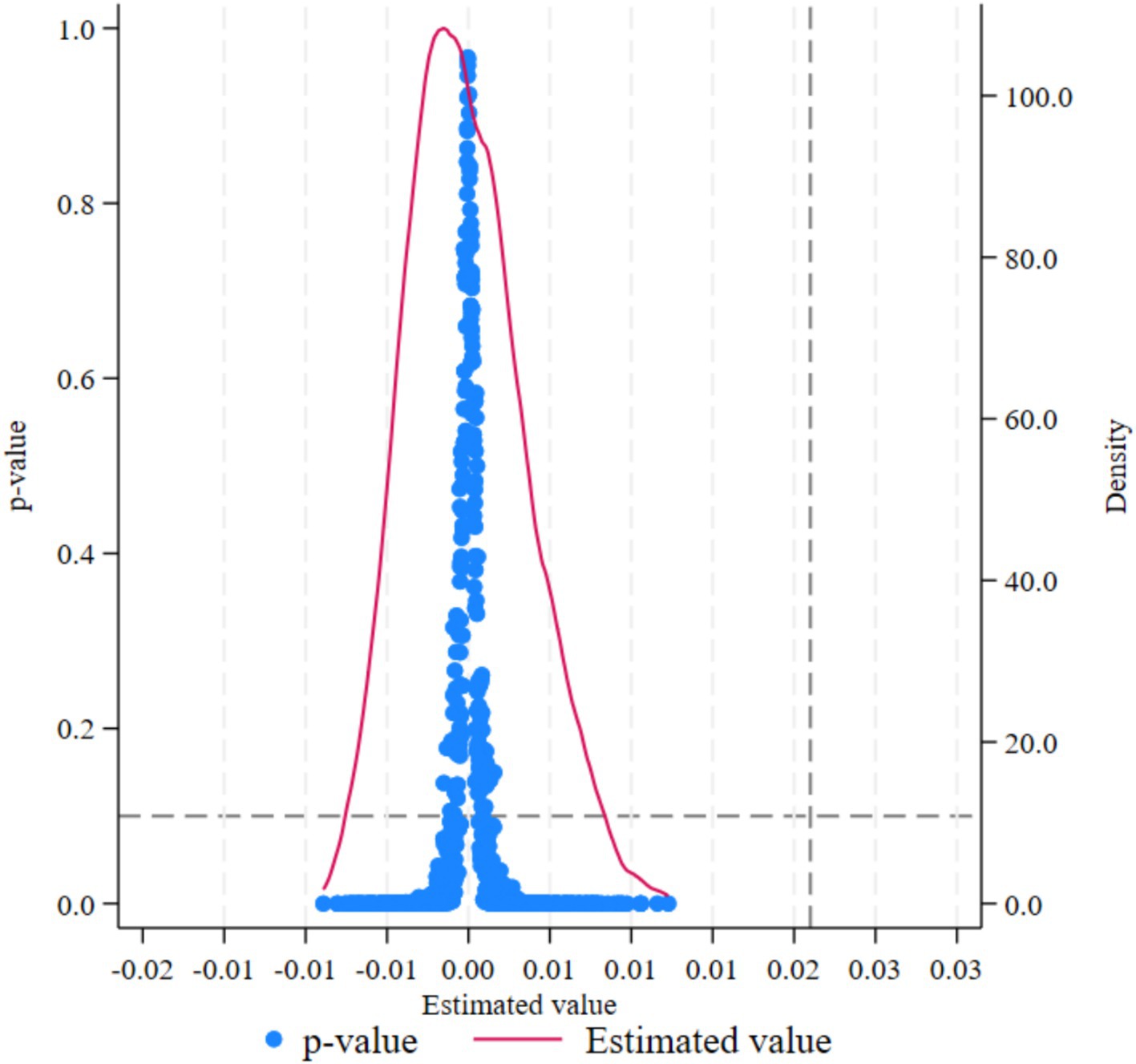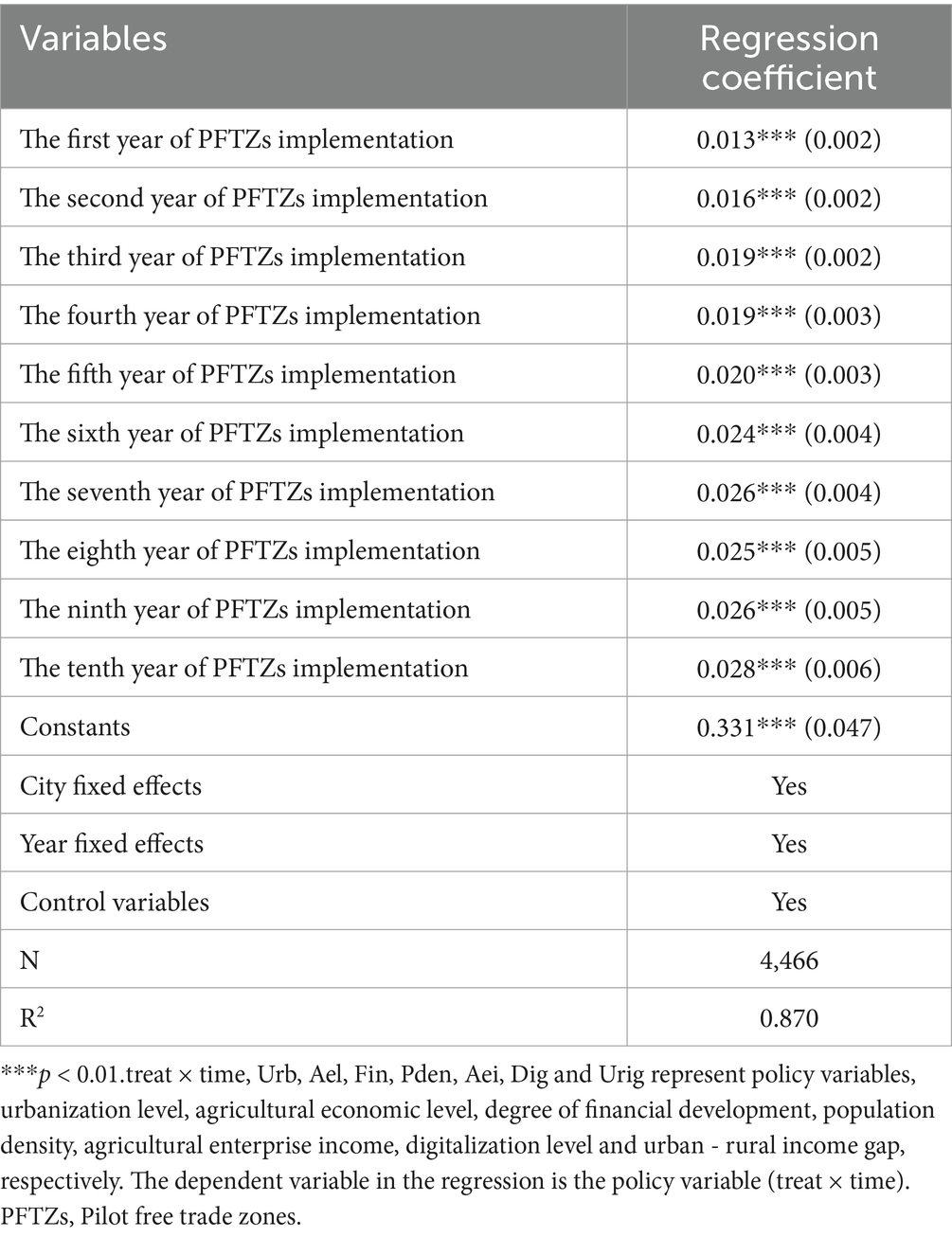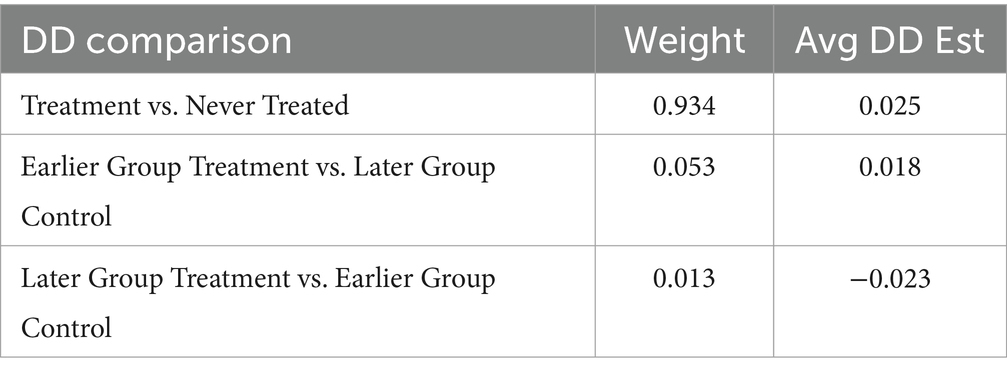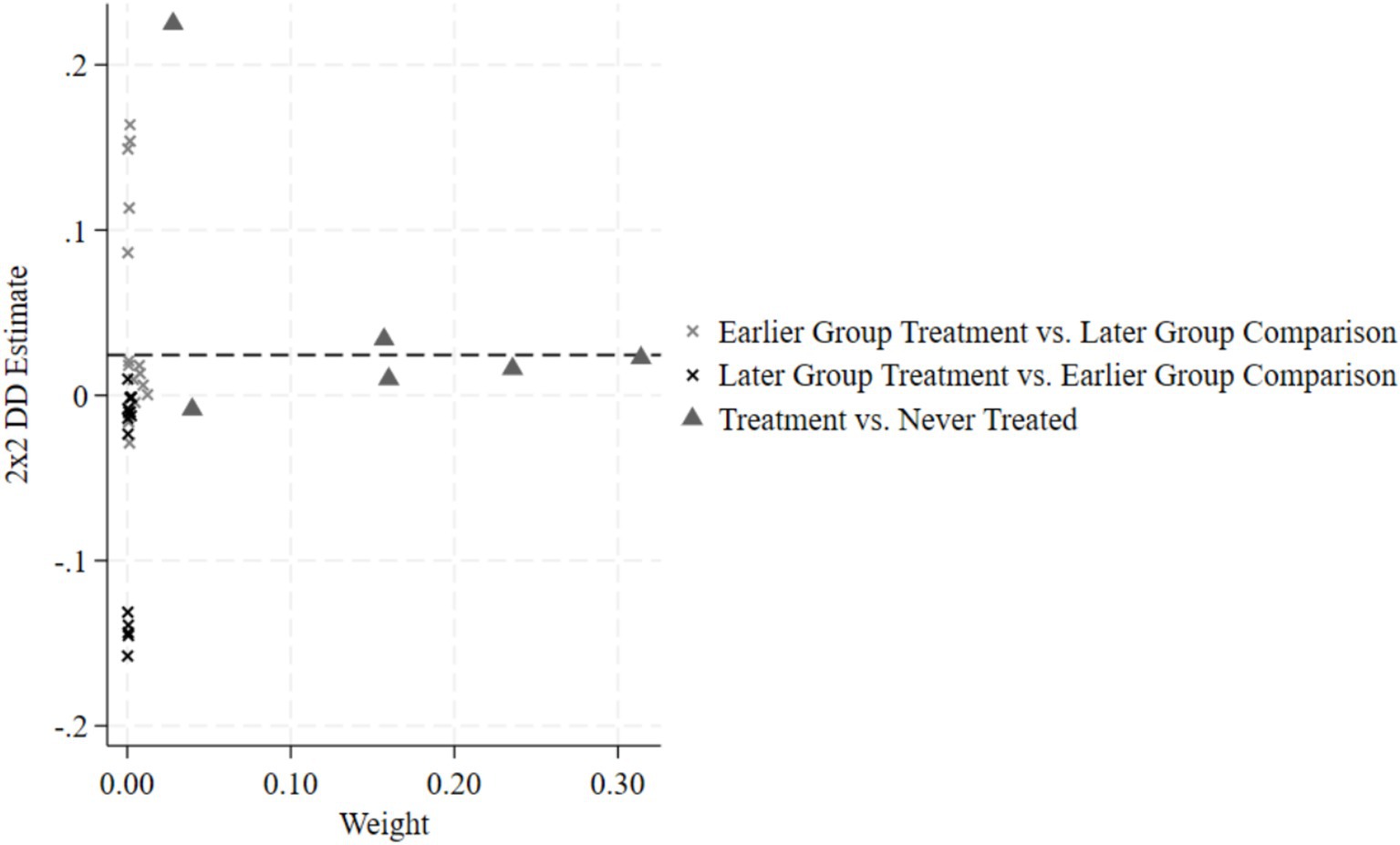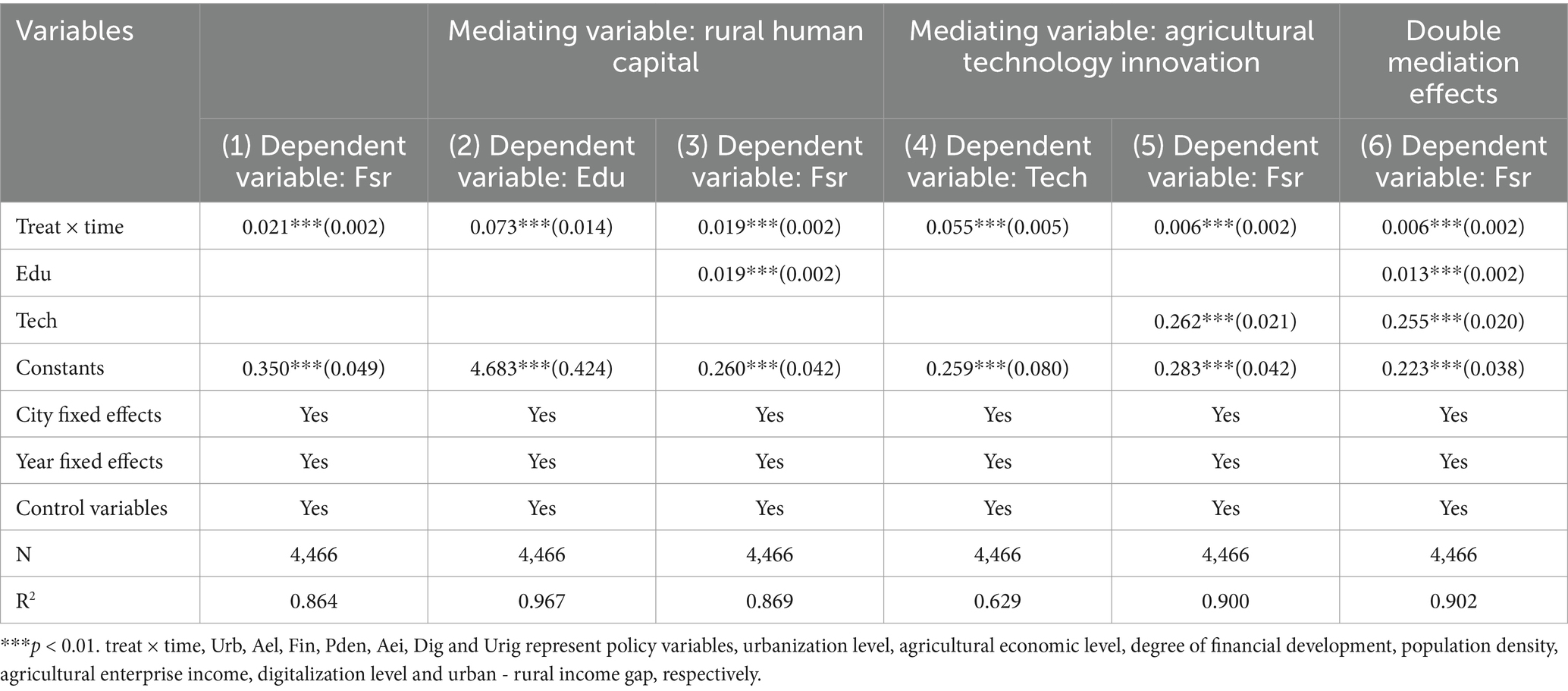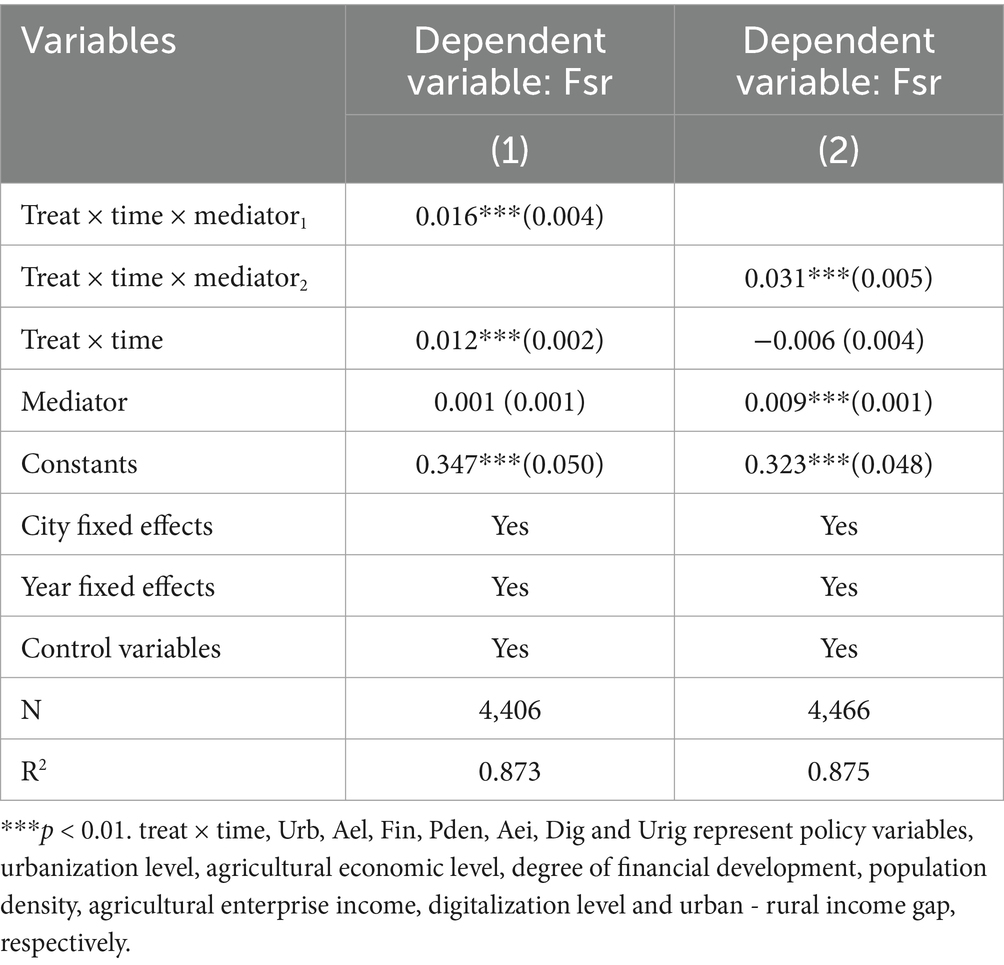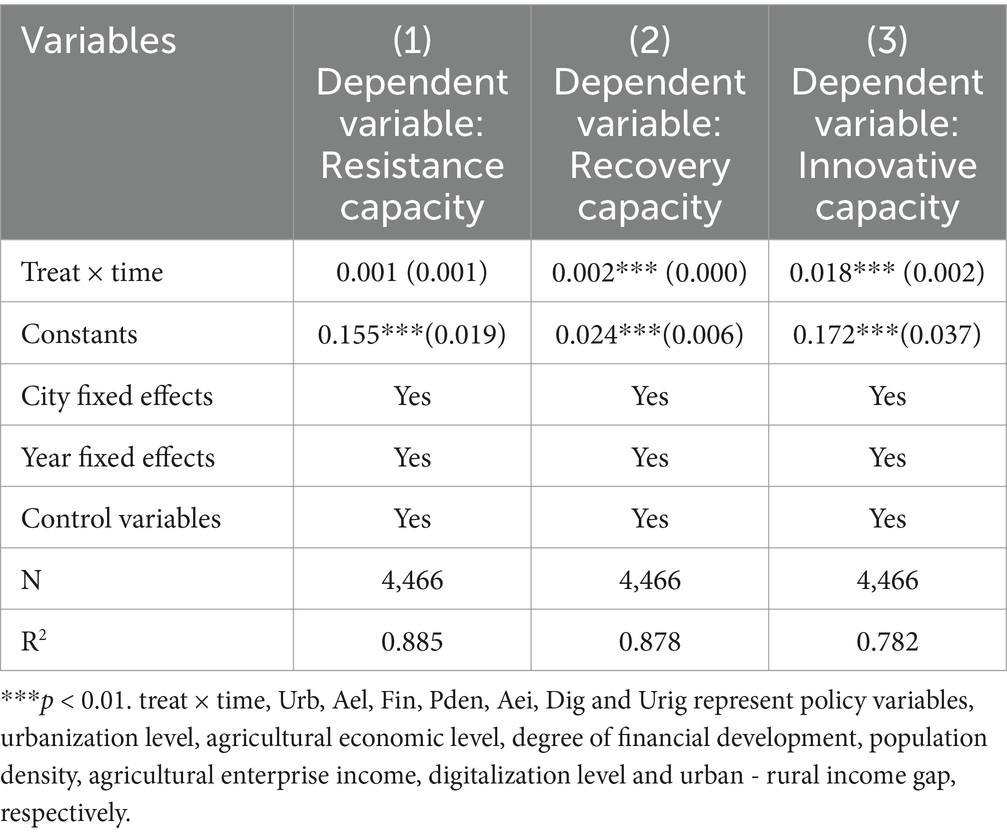- 1School of Business, Yangzhou University, Yangzhou, China
- 2School of Economics and Management, Nanjing Agricultural University, Nanjing, China
Introduction: Enhancing the resilience of food systems is of paramount importance when faced with frequent and uncertain shocks. As pioneering zones for advancing reform and opening up in China, the pilot free trade zones provide a unique perspective for studying the impact on food system resilience. The existing literature rarely explores the mechanisms of improving food system resilience from the perspective of pilot free trade zones. Therefore, this study used the implementation of China’s pilot free trade zones as a quasi-natural experiment to analyze the impact on food system resilience and its mechanisms.
Methods: This study initially resolves the problem of selection bias by employing the propensity score matching (PSM) method, and then estimates the extent of the impact of pilot free trade zones on food system resilience through the staggered differences-in-differences (staggered DID) method, finally examining the mechanisms by which pilot free trade zones affect food system resilience using the mediation effect model.
Results and discussion: Pilot free trade zones can promote food system resilience. Rural human capital and agricultural technological innovation were crucial channels through which pilot free trade zones enhanced food system resilience. From the perspective of heterogeneity, the implementation of pilot free trade zones primarily enhances the innovation capability of the food system resilience, in contrast to its resistance and recovery capabilities. Additionally, the pilot free trade zones have a stronger promoting effect on coastal areas compared to inland regions of China. Furthermore, these zones have a greater enhancing effect on the western regions of China, compared to the eastern and central regions. Finally, the pilot free trade zones demonstrate a more pronounced effect on enhancing non-grain-producing areas compared to major grain-producing regions.
Conclusion: To achieve synergistic development for high-quality construction of pilot free trade zones and food system resilience, it is necessary to promote high-quality construction of pilot free trade zones, enhance rural human capital, and agricultural technological innovation.
1 Introduction
Frequent uncertainty shocks greatly affect food system resilience (Gai and Yang, 2023). Russia and Ukraine are among the top three exporters of grains, such as wheat, barley, and corn. In 2022, the Russia–Ukraine conflict directly affected the global agricultural food system, causing international wheat prices to rise by 8.75–21.5% (Neik et al., 2023). China relies heavily on grain imports from Russia and Ukraine, making geopolitical conflicts a significant threat to the stability of China’s food system. In 2020, the coronavirus disease 2019 (COVID-19) pandemic disrupted food production and processing. This, along with food export restrictions imposed by some countries, has disrupted the global food supply chain and affected food security (Lioutas and Charatsari, 2021). This exposed the vulnerability of the food system when faced with shocks, exerting pressure on maintaining food security (Zhou et al., 2023). Therefore, amid frequent uncertainty shocks, food system resilience has gained significant attention from scholars, highlighting the urgency and necessity of conducting systematic research.
China’s pilot free trade zones (PFTZs) are significant instruments of institutional innovation and serve as vanguards in this arena. The legalization of supervision, liberalization of investment, facilitation of trade, and internationalization of finance are the four common experimental tasks of PFTZs. Based on these tasks, China’s 21 PFTZs have implemented a series of measures. As an important component of China’s opening up to the outside world, agriculture has also become one of the crucial contents in the reform and experimentation of PFTZs. Among them, three PFTZs have been clearly planned as those specifically targeting the characteristic development of agriculture. For instance, the Shaanxi PFTZ focuses on agricultural technological innovation and demonstration, and it comprehensively expands international cooperation in the agricultural field. Other PFTZs, relying on local agricultural conditions and characteristics, have organically combined agricultural measures with the development measures of other industries and implemented a series of differentiated agricultural development measures. For example, the Zhejiang PFTZ emphasizes the development of aquatic product trade; the Yunnan PFTZ creates new business models for cross-border agro-product e-commerce; the Heilongjiang PFTZ develops cross-border green agricultural products; and the Hunan PFTZ establishes demonstration sites for agricultural technology industries. It can be seen that in China, which has a vast territory and significant differences in resource endowments, different regions have taken agricultural development into consideration when implementing PFTZs and have also emphasized the development of agriculture with characteristics and advantages, which provides an opportunity for China’s overall agricultural development. As food is an important part of agriculture and food security directly relates to the well-being of rural residents (Lu et al., 2022), the implementation of PFTZs is bound to have an impact on the food system.
Studies have explored food system resilience, including the connotations, measurement methods, and influencing factors. The concept of resilience was initially applied in the field of ecology (Holling, 1973). With its widespread use in analyzing socio-economic systems, food system resilience emerged accordingly. Tendall et al. (2015) defined food system resilience as the ability of a food system to consistently provide sufficient, appropriate, and accessible food, while achieving related food security goals in the face of external uncertainties (Tendall et al., 2015). Although there are relatively few definitions of food system resilience, people are increasingly aware of the need to study how to cope with uncertain shocks from the perspectives of households, regions, and countries so as to ensure food security. The healthy development of the food system has different implications for different entities. For households, food system resilience focuses on dynamically maintaining a certain level of well-being (Campbell, 2009). For a city composed of producers, consumers, markets, and other elements, food system resilience emphasizes the capacity to respond to various uncertainties and maintain production levels, highlighting the sustainable development of the urban food system. However, food system resilience is centered on the ability of the food system to respond to uncertain shocks during dynamic evolution. To measure food system resilience, existing research uses various measurement indicator systems for different subjects and levels; however, a unified research paradigm has not yet been established. Studies at different levels, such as household, community, national, and global, commonly include natural conditions, economic level, and agricultural foundation in their evaluation of indicator systems (Kc et al., 2024). Moreover, studies have focused on the effects of industrial structure, social capital (Crespo et al., 2014), and government subsidies (Cabell and Oelofse, 2012) on food system resilience. Scholars emphasize that enhancing food system resilience is an urgent challenge, related to the issue of future food security. Therefore, it is necessary to have a comprehensive understanding of the factors that affect food system resilience in order to cope with shocks (Zurek et al., 2022). However, existing research has overlooked the impact of PFTZs, an important institutional opening measure, on food system resilience.
As an institutional opening measure, PFTZs have introduced numerous institutional innovation measures, which profound impact on economic development in their jurisdictions (Ai et al., 2024). Scholars examined the impact of PFTZs implementation on urban development (Feng et al., 2023), regional economic growth (Liu J. G. et al., 2021), and national transformation (Wang et al., 2022). From a micro perspective, studies focus on the effects on trade efficiency (Wang et al., 2023), industrial structure upgrading (Ma et al., 2021), corporate production efficiency, and agricultural development (Wu et al., 2024). In terms of agricultural development, PFTZs reduce import and export trade tariffs on food and strengthen the regulatory mechanism for food production and sales, thereby improving food trade efficiency and promoting agricultural technology to stimulate agricultural industry upgrades (Jiang et al., 2023). Furthermore, PFTZs, which serve as test fields for institutional innovation, show mixed outcomes in regional overall development. Some scholars argue that PFTZs actively promote development in their areas, creating knowledge spillover and demonstration effects that drive development in the surrounding urban areas (Yang et al., 2024). However, Jenkins and Kuo (2017) used Myrdal’s backwash effect theory and demonstrated that PFTZs impeded the free flow of resources and trade, widened wealth gaps, and were detrimental to overall regional economic development (Jenkins and Kuo, 2017). Meanwhile, the development of this institutional opening-up, while promoting the liberalization and facilitation of grain trade, is regarded by many scholars as being unfavorable to food development. Given the feeble agricultural development and the evidently weaker competitiveness of farmers in developing countries, trade openness may not be commensurate with unleashing the agricultural production potential of developing countries (Moon, 2011). It may also lead to the influx of foreign food, impacting the balance between domestic food supply and demand, resulting in a decline in domestic food prices. Consequently, the benefits of farmers will be affected and the fluctuations in the food market will be exacerbated (Ali et al., 2019). The implementation of PFTZs means higher levels of openness, which brings about the possibility of facing more shocks, and its impact on the resilience of the food system remains unclear. Therefore, against the backdrop of frequent and uncertain shocks at home and abroad, does the free trade pilot zone enhance the resilience of the food system? And how does it act on food system resilience? Solving these problems can provide an important reference for a country on how to choose between “closed” self-protection and “open” seeking for breakthroughs to achieve food security and the sustainable development of food system when facing uncertain shocks.
Therefore, this study examined the impact of PFTZs on food system resilience and its underlying mechanisms. This study aimed to provide a new perspective for enhancing food system resilience. It explores the heterogeneity of the impact of PFTZs on food system resilience and its underlying mechanisms across different dimensions, regional levels, and production structures. Moreover, the mediating roles of rural human capital and agricultural technological innovation are investigated, expanding existing research on this topic.
2 Theoretical analysis and research hypotheses
2.1 Food system resilience
In the 2021 State of Food and Agriculture report, the Food and Agriculture Organization of the United Nations stated that resilience is the capacity of the food system to withstand disruptive factors, ensure long-term sustainable access to adequate, safe, and nutritious food, and maintain the livelihoods of the food system participants. This definition focuses on demand. However, developing countries such as China are more concerned with a stable food supply. Building upon the foundational resilience framework introduced by Fröhlich and Hassink (2018), this study integrates the concept of resilience into the context of food systems, underscoring that resilience is inherently dynamic, multidimensional, and influenced by a multitude of factors (Fröhlich and Hassink, 2018). Food system resilience is defined as achieving adaptive development through internal organizational adjustments to resist external shocks, recovering quickly from shocks, and shifting to new growth paths. This is reflected in three aspects: resistance, recovery, and innovation capacity. Resistance ability is the capacity of the participants in the food system to anticipate the consequences of shocks, make prompt and effective responses, disperse the impact of shocks, and interrupt their influence. Recovery ability is the capacity of the food system to rely on its self-recovery and repair functions to return to a stable development state after being affected by shocks and experiencing certain negative effects (Zurek et al., 2022). Innovation ability is the capacity of the food system to innovate economic growth paths after being struck by shocks. It aims to offset the negative impacts of the shocks and simultaneously promote the rapid growth of the food system resilience. This often requires the input of more resource from external sources (Hansen et al., 2020).
The resistance, recovery, and innovation capabilities of food system resilience form a closely intertwined and dynamically evolving structural system. From a synergetic perspective, the resistance ability of the food system, as the first line of defense, determines the extent of impact in the initial stage of a shock and provides the initial conditions for the operation of the recovery ability. The recovery ability is the adjustment link after suffering a shock. It connects with the resistance and provides an opportunity for innovation. During the recovery process, the adaptive adjustments of the system structure will lay bare the limitations in the development of the original food system, thus stimulating the demand for innovation, that is, the innovation ability. From the aspect of dynamic development, in the initial stage of a shock, the resistance ability dominates, followed by the activation of recovery ability. The innovation ability permeates throughout the entire process during which the food system copes with shocks. Thus, seamless connection and effective synergy among these three capabilities during diverse stages are successfully accomplished, jointly shaping the strong resilience of the food system in a complex and changeable environment and ensuring its stability and development.
2.2 Direct impact of pilot free trade zones on food system resilience
Guided by institutional innovation, PFTZs can fully leverage their capacity for shock resistance testing, drive relevant policy reforms, enhance food system resilience, and adapt to changes in both internal and external environments.
PFTZs are beneficial for optimizing the food industry chain and enhancing food system resilience. PFTZs can implement policies such as subsidies to attract foreign investment into the food sector, introduce advanced agricultural production technologies and varieties, and promote high-tech agricultural enterprises. This enhances China’s agricultural technological innovation capability, thereby innovating food production methods, promoting the development of the food industry in technology-intensive directions, and enhancing food system resilience (Wu et al., 2022). PFTZs can also significantly reduce tariffs on agricultural products, relax import quotas and restrictions, and simplify customs procedures through institutional innovation (Aghion et al., 2014). This increases regional openness, allowing a greater variety of agricultural products to enter the market, enriching consumers’ choices and providing more references for local food cultivation. This helps form an integrated development model for the entire food industry chain, which includes cultivation, production, warehousing, logistics, processing, and trade. It promotes the upgrading and transformation of the entire food industry chain and effectively mitigates the risks of disruptions in the food production chain. Thus, it enhances food system resilience.
Furthermore, PFTZs strengthen the food supply chain and enhance food system resilience. PFTZs reduce trade barriers among countries, granting access to a more extensive range of countries for food imports and thereby enhancing the stability of the imported food supply. At the same time, they typically possess an advanced transportation infrastructure and are located near ports, offering greater efficiency in food transportation. This proximity copes with the impacts of uncertainty, thereby ensuring the timely delivery of food and enhancing food system resilience (Ajibade et al., 2023). Moreover, the institutional innovations of PFTZs are a key driver in the development of smart agriculture. Modern digital management information systems reflect the real-time dynamics of the international food market and are equipped with forecasting functions to respond effectively to market volatility risks. This enables timely adjustments to avoid the impact of natural disasters and economic shocks on food production and ensures the integrity and safety of the food supply chain (Manogaran et al., 2018), thereby enhancing food system resilience.
Finally, PFTZs are conducive to increasing the food value chain and enhancing food system resilience. PFTZs leverage their institutional innovation advantages to vigorously develop industries such as seed and fertilizer. They import resource elements with a comparative disadvantage, reduces costs, enhances the research efficiency of the food sector, and improves their position in the global food value chain (Shahid et al., 2023), thereby increasing food system resilience. Currently, developed countries primarily undertake research and development and agricultural input; conversely, developing countries, such as China, remain relatively weak in these areas, affecting the stability of their food value chains. PFTZs can focus on building clusters in weak segments through institutional innovation, thus enhancing food system resilience. In addition, as pioneers of institutional innovation, PFTZs can use dividends from institutional innovation to transition food production from a single production segment to a self-processing and production segment, leading to the creation of food brands, promoting an upgrade in the division of labor (He and Liu, 2023). These transformations enhance the division of labor in the food value chain, increase the added value of food, and help China gain control and discourse power over the food value chain, thereby enhancing the overall resilience of the food system.
Hypothesis 1: The implementation of FTPZs improves food system resilience.
2.3 Indirect effects of pilot free trade zones on food system resilience
2.3.1 Rural human capital
PFTZs enhance food system resilience by improving rural human capital. First, PFTZs facilitate the improvement of rural human capital. A series of institutional innovations have been implemented in PFTZs, such as simplifying the process of establishing enterprises, offering tax incentives, and providing efficient administrative services. These measures have significantly enhanced the attractiveness of foreign-invested enterprises, leading to a substantial increase in the number of enterprises within the region. Concurrently, the industrial structure of the area has been optimized, which has effectively transformed the employment structure of the rural population, presenting new opportunities and a more diversified landscape for rural workers (Liu X. et al., 2021). Among them, the significant growth in employment opportunities in agricultural enterprises has strongly motivated rural workers to actively learn new agricultural skills and knowledge, thereby effectively enhancing the level of rural human capital (Martin and Sunley, 2020). Meanwhile, the development trend of enterprises within PFTZ areas is significantly more prominent than that in non-PFTZ areas. The relatively high salary and welfare levels attract human capital to aggregate in enterprises. To endow this part of the relatively low-cost labor force with certain job capabilities, enterprises usually introduce educational, training and research institutions from both domestic and international sources, providing rural residents with opportunities to learn relevant skills, thus facilitating the improvement of rural human capital in PFTZs (Aldieri et al., 2019; Wang et al., 2022). Second, these improvements help strengthen food system resilience. On the one hand, strengthening rural human capital has not only significantly enhanced farmers’ cognitive abilities and skill levels but also greatly increased their receptivity to new technologies and knowledge. This promotes the modernization, intelligence, and digitalization of the food industry, thereby reducing the sensitivity and exposure of food production to natural risk impacts (Ren et al., 2022). On the other hand, the self-organizing capacity of the food system environment and its sustainability under potential shocks and risks from environmental changes are fostered (Shen et al., 2024).
Hypothesis 2: PFTZs can enhance food system resilience by improving rural human capital.
2.3.2 Agricultural technological innovation
First, PFTZs are conducive to agricultural technological innovation. Within the PFTZs, the strengthened protection of intellectual property rights offers a solid legal guarantee for agricultural technological innovation and stimulates more innovation and research and development. The trade facilitation measures reduce transaction costs and barriers to technological exchanges, which are conducive to learning advanced international technologies and management experience and creates favorable conditions for agricultural technological innovation. With the settlement of high-tech agricultural enterprises, the latest agricultural technologies are introduced to the local area, thereby elevating the local agricultural technological level. In addition, the policy incentives and institutional innovations in PFTZs optimize the competitive development environment of enterprises, enhance their innovation momentum and willingness, and promote agricultural technology research and innovation (Li and Gao, 2022). Second, agricultural technological innovation promotes food system resilience by ensuring the stability and growth of food production. For instance, genetically modified technologies and biobreeding techniques significantly improve crops’ drought resistance and pest resistance, effectively mitigating the impact of natural disasters on food production (Chen and Yang, 2019). Digitally oriented agricultural technological innovations enable real-time monitoring and management of the food production process, enhancing the adaptability of food systems to uncertainties and overall resilience. Furthermore, agricultural technological innovation has a profound impact on the upgrading of the food industry structure, such as in facility and ecological agriculture. These innovations break through the limitations of the natural environment, ensuring the stable production of agricultural products. It further extends and enriches the food industry chain, comprehensively enhancing all aspects from the origin of planting and breeding to processing and sales, thereby strengthening the adaptability and risk resistance of the food system to changes in the market environment (Guan et al., 2023). Figure 1 illustrates the conceptual model.
Hypothesis 3: PFTZs can enhance food system resilience by promoting agricultural technological innovation.
3 Materials and methods
3.1 Data sources
To maintain consistency and scientific validity in the analysis, the study sample comprised 280 prefecture-level cities in China from 2001 to 2022, including 50 PFTZ samples and 230 non-PFTZ samples, for a total of 6,160 observations. Due to significant data gaps in certain Chinese prefecture-level cities, such as Lhasa, Yili, and Shigatse, where political, religious, and cultural factors prevent data acquisition, these cities were excluded from the analysis. Information on food system resilience was sourced from multiple repositories, including the National Information Center’s Macro Economy and Real Estate Database, local statistical offices in China, and various yearbooks, such as the China City Statistical Yearbook, China Rural Statistical Yearbook, China Population and Employment Statistics Yearbook, China Urban and Rural Construction Statistics Yearbook, China Urban and Rural Statistics Yearbook, China Social Statistics Yearbook, China Civil Affairs Statistics Yearbook, and China Tertiary Industry Statistical Yearbook. Data on urbanization levels and digitalization level were retrieved from the China Rural Statistical Yearbook. Agricultural economic level data were obtained from the China Economic Information Network database. Financial development data were obtained from various city statistical yearbooks in China. Population density data were obtained from China City Statistical Yearbook. Information on agricultural enterprise income was obtained from the China Agricultural Yearbook. Urban–rural income gap data were obtained from China Urban and Rural Statistics Yearbook. Data on rural human capital were sourced from the China Education Statistics Yearbook, and information on agricultural technological innovation was collected from the National Intellectual Property Administration of China. Table 1 presents the key variables used in the empirical analysis. Table 2 provides the descriptive statistics of the key variables for PFTZs and non-PFTZs. Table 3 shows the significance test for the differences between the main variables in PFTZs and non-PFTZs.

Table 3. The significance level of the differences between the main variables in PFTZs and non-PPFTZs.
3.2 Study design
The traditional difference-in-differences (DID) method is used to examine the impact of policy interventions. However, applying the traditional DID directly to analyze the effects of PFTZs implementation on food system resilience presents two flaws. First, the implementation of PFTZs did not occur in a single year, but in 2013, 2015, 2017, 2019, and 2020. Second, the regions where PFTZs are implemented are not randomly selected and are influenced by various factors, including distance from ports, industrialization levels, and government intervention degree. Regions with higher levels of industrialization tend to have more developed economies and produce a greater quantity of products available for trade activities, affecting the likelihood of trade occurrences. The distance from ports reflects the degree of openness to external markets and the convenience of conducting trade, directly influencing trade efficiency between different regions. The extent of government intervention demonstrates the government’s capacity to allocate regional resources and its significant regulatory role in the liberalized trade market as the “visible hand.” Therefore, distance from ports, industrialization levels, and government intervention degree each influence the occurrence, efficiency, and sustainability of trade. These factors are crucial references for the state in implementing PFTZs, leading directly to selection bias between treatment and control groups and violating the parallel trends assumption. To address these issues, this study refers to Fauver et al. (2017) and others, employing the staggered difference-in-differences (staggered DID) method to tackle the issue of multiple policy implementation points (Fauver et al., 2017). Additionally, following Wu et al. (2023), we use the Propensity Score Matching (PSM) method to address sample self-selection issues (Wu et al., 2023). Finally, combining both methods, namely PSM-staggered DID, we conduct our research.
3.3 Model settings
3.3.1 Apply propensity score matching to the samples
To address sample selection bias, this study employs the PSM method to filter and match samples from 280 prefecture-level cities for the period 2001–2022 in China, ensuring that the “parallel trends” assumption is satisfied.
in Equation 1 X represents a set of covariates, including distance from ports, industrialization levels, and government intervention degree; represents the propensity score, reflecting the probability that prefecture-level cities with characteristic variable X implement PFTZs; is a linear function; and is the probit function. In the matching process, a probit model was initially applied to estimate the likelihood of prefecture-level cities in China implementing PFTZs based on the covariates. Subsequently, the propensity scores for each sample were calculated based on the model output. Finally, these propensity scores were used to conduct one-to-one, non-repetitive nearest-neighbor matching and select the optimal control and treatment groups for each year.
3.3.2 Impact of PFTZs on food system resilience
Next, we used staggered DID to assess the effects on food system resilience, as follows:
where represents the level of food system resilience of the -th prefecture-level city in the -th year; is used as the policy variable; measures the effect of PFTZs on food system resilience; represents the set of control variables, including urbanization level, agricultural economic level, population density, agricultural enterprise income, digitalization level and urban - rural income gap; and are the city and year fixed effects, respectively; and is a random error term.
3.3.3 Mechanisms of the impact of PFTZs on food system resilience
This study investigated the mediating effects of rural human capital and agricultural technological innovation on the impact of PFTZ implementation on food system resilience. Equations 3–7 were used to develop the mediation effect model.
where rural human capital (Edu) and agricultural technological innovation (Tech) are the mediating variables, and the other variables and symbols have the same meaning as those in Equation 2. Several steps were taken to validate the mediation effects. First, we tested the significance of the coefficient in Equation 2 to verify the significance of the overall effect. Second, we tested the significance of coefficients in Equation 3, in Equation 4, in Equation 5, in Equation 6, and and in Equation 7. If these coefficients were significant, then the indirect effects were significant. Third, we tested the significance of coefficient in Equation 7. If the coefficient was significant, then the direct effect was significant. Fourth, we examined the signs of the coefficients. If the sign of matched those of × and × , then rural human capital and agricultural technological innovation had partial mediation effects, with effect sizes of × and × , respectively.
3.3.4 Mediation model robustness
To test the mechanisms by which PFTZ implementation impacts food system resilience, this study employed the difference-in-difference-in-difference (DDD) method, as follows:
in Equations 8,9 and are dummy variables representing whether cities with high rural human capital and high agricultural technological innovation, respectively. When the rural human capital of the -th city surpasses the average of all cities, it is classified as having high rural human capital, and is assigned a value of 1, otherwise 0. Similarly, if the agricultural technological innovation of the -th city exceeds that of all other cities, it is considered to have high agricultural technological innovation, and is assigned a value of 1, otherwise 0.
3.4 Variable selection
3.4.1 Dependent variable
The dependent variable was food system resilience (Fsr). This study adopted a comprehensive evaluation method following Zhou (Zhou et al., 2023) and assessed food system resilience in three dimensions: resistance, recovery, and innovative capacity. The implications and connections of the three dimensions have been explained in detail above. Resistance capacity included four sub-dimensions: economic foundation, production conditions, ecological level, and social factors. The economic foundation reflects the local food development status, and stronger economic foundations can withstand external shocks. Production conditions and ecological levels are the key factors that determine the food production scale and output quality. Regions with superior production conditions often have more developed food operations, and ecosystem health is directly linked to sustainable food output, exhibiting strong comprehensive resilience. Social factors are related to the survival and development of the main entities in a food system. A rationalized employment structure promotes continuous industrial development. Medical insurance provides the necessary social security for the production capacity of the food system, and convenient transportation facilitates the trade of food and technology. Recovery capacity of the food system was measured using economic growth indicators. Faster economic growth can more rapidly outpace the diminishing effects of a shock, negating the adverse effects and allowing the food system to recover swiftly. Innovation capacity of food systems included two subdimensions: financial support and technological progress (Ye et al., 2022). Financial support is critical in the innovation and transformation of food systems. Sufficient funding is crucial for food systems affected by shocks. Technological progress indicates regional agricultural technological development. Greater total power of agricultural machinery per capita and rural electricity consumption indicates that the food system production model advances toward intelligent and modern development. Higher level of industrial structure is associated with higher regional technological progress. Tertiary indicators for measuring economic foundation, production conditions, ecological levels, social factors, economic growth, financial support, and technological advancement are listed in Table 4. To confirm the weights of the indicators across the dimensions, we used the entropy method to calculate food system resilience.
3.4.2 Policy variable
The policy variable was defined as treat × time. is treated as a group dummy variable indicating whether the -th prefecture-level city has implemented PFTZs, with a value of 1 if it has and 0 if it does not. is a policy timing dummy that identifies the specific implementation periods of PFTZs, assigned a value of 1 for the year of initiation and subsequent years, and 0 otherwise.
3.4.3 Control variables
Various factors influence food system resilience. At the farmer level, the main factors include the urban - rural income gap. At the agricultural level, the primary elements are the level of agricultural economy and agricultural enterprise income. At the rural level, the chief factor is the digitalization level. At the regional level, the main aspects are the urbanization rate, financial development, and population density. The principal variables from different levels are selected as control variables. First, the urbanization rate (Urb) was quantified as the percentage of the urban permanent population relative to the city’s total population. Second, the level of agricultural economy (Ael) was gauged by the value added in the primary sector. Third, the degree of financial development (Fin) was indicated by the ratio of the year-end loan balances of financial institutions to the regional GDP. Fourth, population density (Pden) was assessed as the ratio of the permanent resident population to the land area of the city. Fifth, agricultural enterprise income (Aei) was determined by the main annual business revenue of large-scale agricultural product processing companies. Sixth, digitalization level (Dig) was measured by the proportion of administrative villages with access to broadband Internet services. Finally, urban–rural income gap (Urig) was evaluated by the ratio of the average income of urban residents to that of rural residents.
3.4.4 Mediating variables
The intermediary variables considered in this study were rural human capital (Edu) and agricultural technological innovation (Tech). Rural human capital was evaluated based on the average educational attainment of rural inhabitants. Agricultural technological innovation was measured by the number of patents in the agricultural industry.
4 Results
4.1 Baseline regression results
The regression results in Table 5 illustrate the effects of PFTZs implementation on food system resilience. Columns (1) and (2) present the results of direct regression estimation without PSM, whereas Columns (3)–(6) present the results of PSM and staggered DID estimation. The treat × time variable interaction is significant, with a value of 0.021. This indicates that PFTZs enhance food system resilience. Under the condition of other factors remaining unchanged, the implementation of PFTZs has led to an average increase of 2.1% in the resilience of the food system, thereby supporting Hypothesis 1. A comparison of the coefficients of treat × time revealed that failing to use PSM to address selection bias and neglecting fixed effects and control variables would lead to an overestimation of the impact of PFTZs on food system resilience. Therefore, to improve the quality of the estimates, we combined PSM and staggered DID methods and included city fixed effects, year fixed effects, and control variables in the model. Further examination of the control variables demonstrated that urbanization, agricultural economic levels, degree of financial development and urban–rural income gap were significantly negative, while population density and digitalization level were significantly positive.
4.2 Balance and common support condition tests
PSM-staggered DID requires the balance and common support conditions to be satisfied. A balance test is considered effective if the standardized bias of the covariates between the two matched groups does not exceed 10%. As shown in Table 6, after implementing PSM, the standardized differences in covariates such as distance from ports, industrialization level, and government intervention degree between the treatment and control groups were all below 10%, demonstrating the validity of the matching. In addition, no statistically significant differences were observed, indicating that cities that implemented PFTZs and those that did not were successfully matched. Thus, the parallel trend assumption of causal inference was satisfied, and the case could be considered a quasi-natural experiment.
Figures 2a,b depict the kernel density distribution of the propensity scores before and after matching, respectively. While prior to matching, the overlap between the treatment and control groups was limited, after matching, the kernel density distributions of the two groups aligned closely. This alignment showed that the matched samples met the common support condition, indicating that the PSM technique effectively reduced the sample selection bias, thereby ensuring the reliability of the regression outcomes derived from the PSM-staggered DID method.
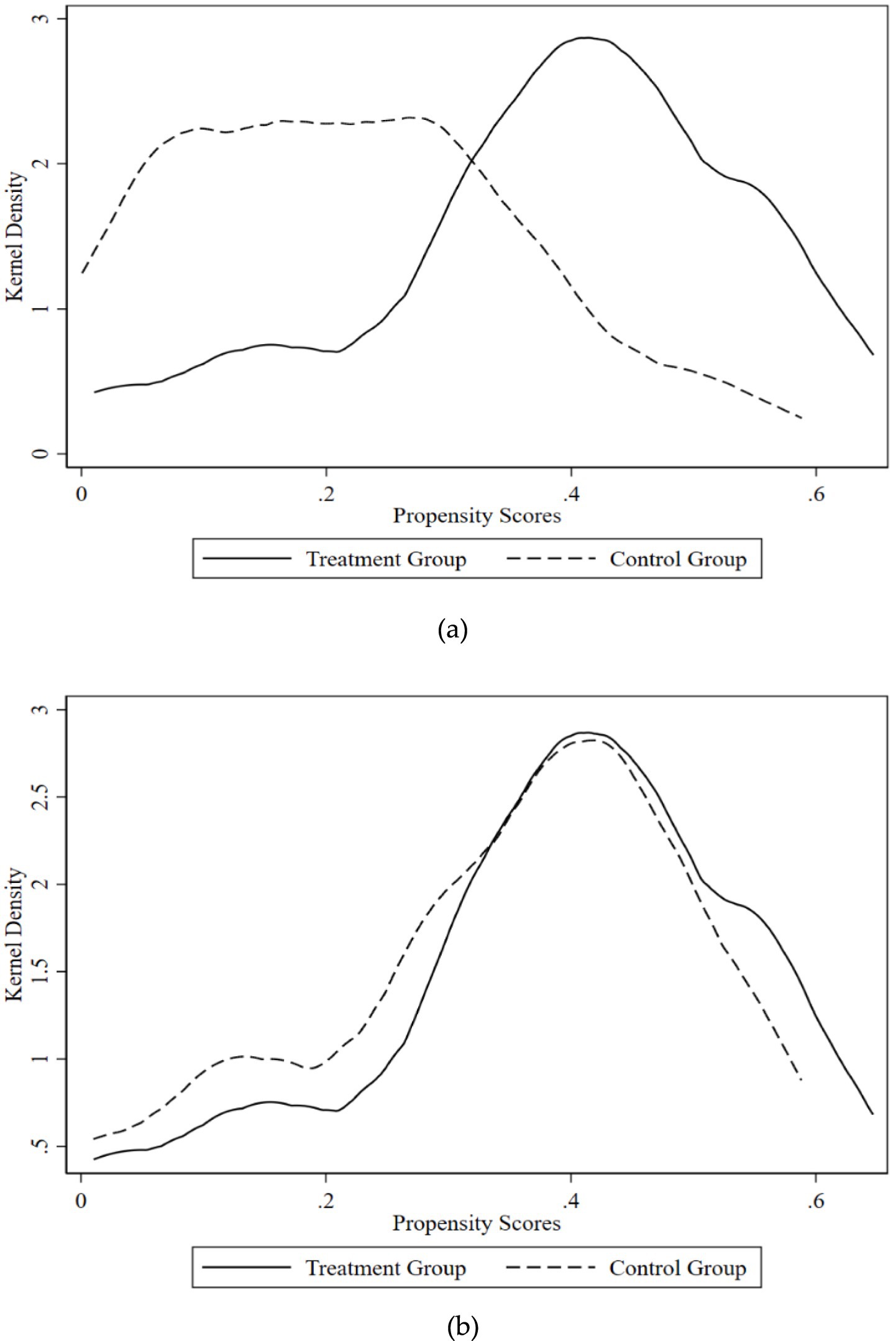
Figure 2. Kernel density distribution of propensity scores before and after matching. (a) Kernel density distribution of propensity scores before matching. (b) Kernel density distribution of propensity scores after matching.
4.3 Robustness checks
4.3.1 Placebo check
A placebo check was conducted to further minimize the impact of unobserved factors on the baseline regression results. Fifty of 280 prefecture-level cities in China were randomly chosen to form the treatment group, generating a virtual PFTZ sample. The remaining cities served as the control group, allowing for the re-estimation of Equation 2. This regression was repeated 1,000 times, and a kernel density graph was plotted, as shown in Figure 3. The influence of unobserved factors was largely excluded, confirming that the baseline regression results were robust.
4.3.2 Dynamic effect check
Considering the potential lagged effect of PFTZs on food system resilience, we used the event study method to empirically assess the policy’s timeliness (Jacobson et al., 1993). As shown in Table 7, the implementation of PFTZs affected food system resilience each year from the start of implementation. Moreover, the treat × time coefficient values exhibited an annual upward trend, suggesting that the influence of the increase in the number of PFTZs in China and the implementation of related agricultural policies on food system resilience progressively developed into a virtuous cycle. The longer the PFTZs were implemented, the greater was their positive effect on food system resilience.
4.3.3 Trimming and truncation checks
To eliminate the influence of outliers, we trimmed and truncated the sample at the 1 and 5% quantiles. Equation 2 was reapplied using the trimmed and truncated samples, and the results are displayed in Columns (1) and (2) of Table 8. The treat × time coefficients remained significant and positive after removing the 1 and 5% outliers, indicating the robustness of the regression results.
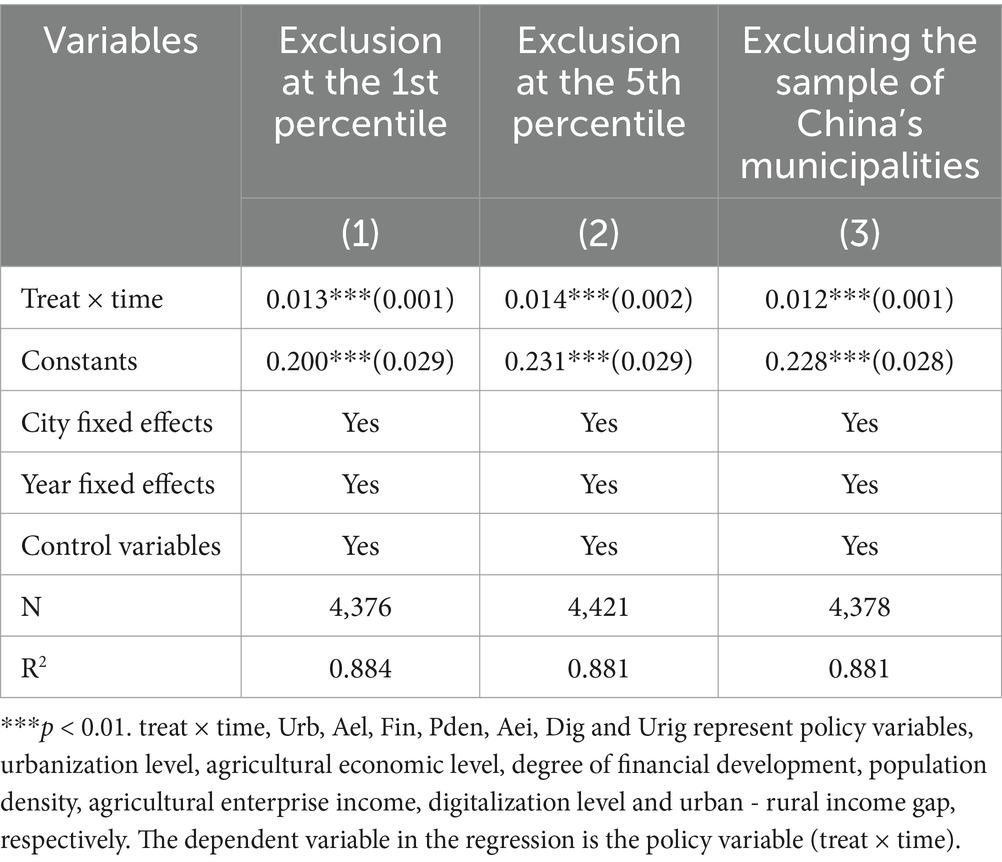
Table 8. Regression results after trimming, truncation, and excluding the sample of China’s municipalities.
4.3.4 Excluding the sample of China’s municipalities
In the baseline regression, the prefecture-level city samples included municipalities. However, compared with other prefecture-level cities, China’s municipalities are advantageous in terms of agricultural policy support, resource allocation, and economic development levels. Therefore, this study excluded the sample of China’s municipalities and reapplied Equation 2, and the results are presented in Column (3) of Table 8. Regardless of whether city-and year-fixed effects are controlled for, the treat × time coefficients are significant and positive, demonstrating the robustness of the regression results.
4.3.5 Goodman-Bacon decomposition test
According to Goodman-Bacon, during the estimation process of the staggered DID model, the two-way fixed effects estimator is equivalent to the weighted average of all possible two-period DID estimators in the sample. There is a high likelihood of encountering problems due to the instability of heterogeneous treatment effects, such as those caused by negative weights, which will confound the comparisons in staggered DID (Goodman-Bacon, 2021). Given the different implementation time points of PFTZs, three types of controls exist in this study: the implementation of PFTZs (Treatment) vs. never implementing PFTZs (Never Treated); the earlier implementation of PFTZs (Earlier Group Treatment) vs. the later implementation of PFTZs (Later Group Control); and the later implementation of PFTZs (Later Group Treatment) vs. the earlier implementation of PFTZs (Earlier Group Control). Among these three types of controls, the first two are preferable as they compare the impact of whether or not to implement PFTZs on food system resilience. However, the treatment effects of the third type of control are not necessarily homogeneous. If the weight of the average estimator of the third type of control is relatively large, it will affect the results of the two-way fixed effects estimator (Wing et al., 2024). Consequently, this study employs the Goodman-Bacon decomposition method to examine whether the proportion of the third type of control is excessively large. As can be seen from Table 9 and Figure 4, the estimated value of the inappropriate treatment effect, namely Later Group Treatment versus Earlier Group Control, is −0.023, with a weight of merely 1.3%. It can thus be considered that the baseline regression results of this study are robust.
4.3.6 Sensitivity analysis
In accordance with the frontier causal inference theory, traditional parallel-trend tests are incapable of effectively discerning the common ascending or descending trends prior to treatment, and may even give rise to estimation distortion and bias (Roth and Sant’Anna, 2023). To tackle this problem, Rambachan and Roth (2023) propose a testing approach applicable in situations where the parallel-trend assumption is violated (Rambachan and Roth, 2023). The underlying concept involves performing inference and sensitivity analysis on the confidence intervals of post-treatment point estimators. This test is composed of two segments: initially, constructing the maximum deviation from parallel trends (Mbar); subsequently, constructing the confidence intervals of post-treatment point estimators corresponding to the aforementioned deviation. If, under the maximum deviation circumstance, the confidence interval of the post-treatment point estimator does not encompass zero, it implies that the treatment effect is robust against deviations from the parallel-trend assumption. Consequently, following the methodology of Biasi and Sarsons (2022), this paper sets the maximum deviation Mbar equal to 1 × standard error to assess the parallel-trend sensitivity of the treatment effect following the implementation of the pilot policy (Biasi and Sarsons, 2022). Matrix1 = (0 \ 0 \ 0 \ 0\ 0 \ 1) is established to verify the shock sensitivity of the policy effectiveness with respect to the resilience of the food system. Figure 5 demonstrate that the parallel trend remains stable under the conditions of relative deviation limit and smoothness limit, signifying that, within a certain range of shock deviation, the implementation of PFTZs can still augment the resilience of the food system.

Figure 5. Sensitivity analysis. (a) The constraint of relative deviation degree. (b) Smoothness constraint.
4.4 Mechanism analysis
To investigate the mechanisms through which PFTZs affect food system resilience, this study employs a mediation effect model, utilizing rural human capital and agricultural technological innovation as mediating variables. By applying Equations 3–7, the study examines how these mediators influence the relationship between PFTZs and food system resilience. The regression results are detailed in Table 10.
First, Column (1) shows that treat × time is significant and positive, indicating a substantial total effect. Overall, the implementation of PFTZs has increased food system resilience. In Columns (2) and (4), treat × time is significant and positive. This indicates that PFTZ implementation has enhanced rural human capital and agricultural technological innovation. The regression results in Columns (3), (5), and (6) show that treat × time, Edu, and Tech are all significant and positive. This indicates that PFTZs’ impact on food system resilience includes a direct effect, and that rural human capital and agricultural technological innovation are partial mediators. In Column (6), the regression results for the mediating variables-rural human capital and agricultural technology innovation-show that the coefficients , , and are all significantly positive. This indicates that the PFTZ implementation enhances food system resilience through both rural human capital and agricultural technology innovation pathways. Additionally, has the same sign as × and × . Under the condition of other conditions remaining unchanged, rural human capital and agricultural technological innovation, serving as mediating variables, have, respectively, contributed to an average increase of 0.1 and 1.4% in the process of PFTZs enhancing food system resilience. This indicates that the mediating role of agricultural technology innovation is greater. The above conclusions validate Hypotheses 2 and 3.
Moreover, we employed a DDD model to evaluate the robustness of the mediation effects associated with the mediating variables. We focused on coefficients of treat × time × mediator1 and of treat × time × mediator2. As shown in Table 11, at the 1% significance level, treat × time × mediator1 and treat × time × mediator2 are significant and positive. This indicated that PFTZs had a greater promoting effect on food system resilience in cities with high rural human capital and agricultural technological innovation than in those with low rural human capital and agricultural technological innovation. This supported Hypotheses 2 and 3.
4.5 Heterogeneity analysis
4.5.1 Dimensional heterogeneity
Food system resilience comprised three dimensions: resistance, recovery, and innovation. This study included resistance, recovery, and innovation as dependent variables in the model using the PSM-staggered DID method for analysis. Agricultural technological innovation directly enhanced agricultural innovation capacity. Consequently, the rural human capital and agricultural technological innovation pathways were more effective in boosting the innovation capability than the resistance and recovery aspects of food system resilience. As shown in Table 12, when the three dimensions were used as dependent variables, PFTZs mainly enhance the recovery ability and innovation ability of food system resilience, with the innovation ability coefficient being the highest and significantly higher. This indicated that PFTZ implementation enhanced the self-adjustment and innovation abilities of the food system in response to shocks.
4.5.2 Coastal and inland heterogeneity
As differences in the distance of prefecture-level cities from the coastline often lead to variations in transportation modes, trade frequency, and economic foundations, this study divided China’s prefecture-level cities into coastal and inland samples (including mainland and island coastlines) and reapplied Equation 2. The Chow test and Fisher’s Permutation test were used to examine the differences in coefficients between groups after the grouped regression. The p-values are found to be significant at the 1 and 10% levels respectively, indicating that there exist significant differences between the two groups. The results are shown in Columns (1) and (2) of Table 13. The results revealed that treat × time was significant and positive for both the coastal and inland samples, indicating that PFTZ implementation significantly enhanced food system resilience in the coastal prefecture-level cities in China.
4.5.3 Regional heterogeneity
There are significant differences among the eastern, central and western regions of China in terms of economic development level, agricultural industrial structure, resource endowment and market environment. We further divided the sample into three regions and reapplied Equation 2. The results of both the Chow test and Fisher’s Permutation test indicate that there are significant differences among the grouped samples. The regression results are presented in Columns (3)–(5) of Table 13. The sample from the western region had the largest treat × time coefficient, suggesting that PFTZs in this region had the most significant impact on food system resilience.
4.5.4 Production structure heterogeneity
To explore the differential effects on food system resilience across regions with distinct production structures, this study drew on the 2003 Opinions on Reform and Improvement of Several Policy Measures for Comprehensive Agricultural Development issued by China’s Ministry of Finance. The sample of prefecture-level cities in China was categorized into major grain-producing and non-grain-producing areas, and Equation 2 was reapplied. Both the Chow test and Fisher’s Permutation test show significance at the 1% level, demonstrating the existence of differences between groups. The regression results are presented in Columns (6) and (7) of Table 13. The treat × time coefficient was larger for non-grain-producing areas, suggesting that PFTZs had a more pronounced impact on food system resilience in these regions.
5 Discussion
5.1 Main findings
The study findings indicate that PFTZs can enhance the resilience of the food system. This is because PFTZs, as an institutional innovation, optimized the industrial chain, strengthened the supply chain, and enhanced the value chain, thereby improving the resilience of China’s food system. This is consistent with Moon’s conclusion that the stable growth of the food system is inseparable from proper institutional guidance (Moon, 2011). However, unlike the macro perspectives of scholars such as Anderson (2005) and Hertel and Keeney (2006) on food production and trade, this study focuses on the micro-level impacts of PFTZs on the resilience, resistance, recovery, and innovation capacities of food system. Examining the control variables, the study found that the coefficients of urbanization level (Urb), agricultural economic level (Ael), degree of financial development (Fin) and urban - rural income gap (Urig) are significantly negative, indicating that higher urbanization leads to more severe agricultural population loss and fewer food production entities, thereby weakening the resilience of food system. The continuous improvement of the agricultural economy may exacerbate the trend of non-foodification, affecting the intrinsic resilience of the food system and reducing its capacity to withstand external shocks. A higher degree of financial development implies that capital is more concentrated within the financial system, failing to flow effectively and there exists the drawback of irrational capital allocation, which restrains the timely utilization of capital in the food system. The greater the ratio of the income gap between urban and rural residents, the more pronounced the imbalance in urban and rural development, which in turn impedes the progress of the food system. The coefficients for population density (Pden) and agricultural digitalization level (Dig) are significantly positive, indicating that regions with higher population density have a more abundant labor resource supply, providing personnel support for enhancing the resilience of the food system. The development of digitalization will be conducive to promoting the intelligent and modern development of agriculture, thereby endowing the food production and operation with greater capabilities.
Second, PFTZs enhance the resilience of the food system through two pathways: rural human capital and agricultural technological innovation, with the mediating effect of agricultural technological innovation being greater than that of rural human capital. Considering the implementation of PFTZs in China, on the one hand, institutional innovation in PFTZs enhances the resilience of the food system by improving rural education levels and vocational skills through financial support, while attracting high-end talent to transform and upgrade the food system. On the other hand, the policy dividends of China’s PFTZs have spurred the development of agricultural technological innovation and attracted substantial capital and international technological equipment. These factors collectively promote continuous innovation in agricultural technology, with technological empowerment driving the robust development of food production capacity, thereby enhancing the resilience of the food system (Wang et al., 2021).
Finally, this study also conducted a heterogeneity analysis. First, regarding dimensional heterogeneity, the mediation regression model verified that after China’s implementation of PFTZs, it mainly influences the resilience of the food system through two channels: rural human capital and agricultural technological innovation. Thus, enhancing rural human capital helps optimize the management methods of new agricultural business entities and reform agricultural production technologies. Agricultural technological innovation directly improves the food system’s innovation capabilities. Therefore, compared to the resistance and recovery abilities of the food system, both the rural human capital channel and the agricultural technological innovation channel are more conducive to enhancing the innovation capability of the food system resilience. Second, concerning inland-coastal heterogeneity, the advantageous geographical location and clear policy direction have provided prefecture-level cities in China’s coastal areas with superior resources and development environments for food system development, enhancing their response capabilities and risk resilience in external shocks. Prefecture-level cities in China’s coastal areas are close to commercial ports, with higher resource flow efficiency, greater openness, and larger outward-oriented economic scales compared to inland prefecture-level cities. These areas are generally more economically developed, attracting more foreign enterprises and international agricultural cooperation projects, effectively enhancing the competitiveness and risk resistance of the food system in China’s coastal prefecture-level cities. Additionally, coastal prefecture-level cities undertake the “Belt and Road Initiative”1 agricultural expansion (Chen and Zhang, 2022). China focuses on supporting these cities as pilot areas for the food system, providing more comprehensive infrastructure and service systems for the international agricultural market, ensuring the efficient operation of the food supply chain, and enhancing the risk resistance capability of the food system in China’s coastal prefecture-level cities. Third, regarding regional heterogeneity, due to geographical and historical development constraints, the economic development level, infrastructure construction, and outward-oriented economic scale of China’s western regions are significantly disadvantaged compared to the eastern and central regions of China, with a lower starting point for development. The PFTZs, through institutional innovation, provides a more solid material and technical foundation for the development of the food system in China’s western regions, thereby greatly enhancing the risk resistance capability of the food system in these regions. Although the eastern and central regions have a leading foundation in food system development, the growth space and marginal effects of the resilience of food system in these regions are relatively weakened. Fourth, regarding production structure heterogeneity, the Chinese government emphasized the development of the food system in major grain-producing areas. These regions have experienced significant rapid growth, with high levels of resource integration, mechanization, grain production capacity, and completeness of agricultural production systems. Even with the support of institutional innovation in PFTZs, it is challenging to further enhance the resilience level of the food system in major grain-producing areas. Conversely, the development of the food system in non-major grain-producing areas is in the early stages. Under the support of the PFTZs, the food system in these areas has been further improved. By integrating the region’s developed industries and services, the depth and value of food processing are enhanced, perfecting the food industry chain, supply chain, and value chain systems in these areas (Wang et al., 2023). This has increased the adaptability and resilience of the food system in non-major grain-producing areas to changes in the external environment.
5.2 Key contributions
Existing research primarily examines the impact of PFTZs on agricultural production efficiency and sustainable development, with little attention to food system resilience. As pilot areas and high-yield zones of institutional innovation in China, there are divergent views on the impact of PFTZs on food production and operation. Moreover, the impact on the resilience of food system has not yet been studied by scholars. Therefore, this study investigates the impact of PFTZs on food system resilience, offering a new perspective compared to previous studies. Additionally, this study innovatively incorporates causal inference methods into studying the effects of PFTZs. The PSM technique is used to address sample selection bias. Next, the staggered DID method is applied to address challenges in evaluating policies across multiple time points. Finally, conclusions are derived from a series of cutting-edge robustness tests, an approach not frequently observed in current research.
5.3 Limitations
This study has certain limitations. First, this study used a series of PFTZs implemented in China as a “quasi-natural experiment” to assess their overall impact on the resilience of food system, lacking an examination of a typical free trade zone to evaluate its impact on food system resilience. Second, due to data limitations, the observation period of this study was restricted to 2001 to 2022. Therefore, other PFTZs implemented in China after 2022 were not included in the study, such as the China (Xinjiang) Free Trade Zone, which have mostly introduced food-related policies, such as the China Heilongjiang PFTZ emphasizing overseas agricultural cooperation and the China Xinjiang PFTZ developing modern large-scale agriculture. Third, this study did not systematically investigate the heterogeneity of different specific provisions of China’s PFTZs on food system resilience. The gradual updating and publication of relevant data and the deepening of related theories on PFTZs will lead to an exponential growth of research in these areas in the future.
6 Conclusion
This study examined the effects of PFTZs on food system resilience in China. The findings reveal several key points: First, PFTZs have a positive impact on food system resilience. Second, rural human capital and agricultural technological innovation are significant mediators in enhancing food system resilience through PFTZs. Third, the impact of PFTZs on food system resilience shows notable heterogeneity. From the perspective of dimensional heterogeneity, PFTZs primarily enhance the innovation capability of food system resilience. Considering inland and coastal heterogeneity, PFTZs have a stronger effect on promoting food system resilience in coastal areas compared to inland areas. From the regional heterogeneity perspective, PFTZs most significantly enhance food system resilience in the western region. Regarding production structure heterogeneity, PFTZs have a greater influence on the food system resilience of non-grain-producing areas compared to major grain-producing areas.
Our findings suggest that high-quality construction of PFTZs would achieve coordinated improvement in the resilience of regional food systems. China should deepen the benchmark role of established PFTZs and promote their implementation in other regions. Moreover, other countries can establish high-quality PFTZs based on regional economic development characteristics, including policies tailored to coastal and inland areas, different regions in the country, and grain-producing and non-grain-producing areas. In addition, relevant agricultural policies and measures for PFTZs should be continuously improved to strengthen the resistance and recovery dimensions of food system resilience.
Furthermore, rural human capital and agricultural technological innovation should drive the development of food system resilience. Countries can support research and higher education institutions, ensuring that their educational scope covers theoretical agricultural knowledge and vocational skills training to comprehensively improve the overall quality of their farmers. In addition, countries can reform their agricultural technological innovation systems, encourage agricultural enterprises to increase investment in scientific research and development, and promote agricultural technological innovation to enhance their ability to withstand potential risk impacts, thereby improving overall food system resilience.
Data availability statement
The original contributions presented in the study are included in the article/Supplementary material, further inquiries can be directed to the corresponding author.
Author contributions
HZ: Conceptualization, Formal analysis, Funding acquisition, Methodology, Validation, Writing – original draft, Writing – review & editing. BZ: Methodology, Software, Validation, Visualization, Writing – original draft. YY: Software, Visualization, Writing – review & editing. CH: Project administration, Writing – review & editing.
Funding
The author(s) declare that financial support was received for the research, authorship, and/or publication of this article. This work was support by the Youth Fund of Humanities and Social Sciences Research of the Ministry of Education (22YJC790006); the China Postdoctoral Science Foundation (2022M722691).
Acknowledgments
The authors are grateful to the reviewers and editors.
Conflict of interest
The authors declare that the research was conducted in the absence of any commercial or financial relationships that could be construed as a potential conflict of interest.
Publisher’s note
All claims expressed in this article are solely those of the authors and do not necessarily represent those of their affiliated organizations, or those of the publisher, the editors and the reviewers. Any product that may be evaluated in this article, or claim that may be made by its manufacturer, is not guaranteed or endorsed by the publisher.
Supplementary material
The Supplementary material for this article can be found online at: https://www.frontiersin.org/articles/10.3389/fsufs.2025.1460485/full#supplementary-material
Footnotes
1. ^The Silk Road Economic Belt and the 21st-century Maritime Silk Road, also known as The Belt and Road (abbreviated B&R), is a development strategy and framework, proposed by Chinese President Xi Jinping that focuses on connectivity and cooperation among countries primarily between China and the rest of Eurasia, which consists of two main components, the land-based “Silk Road Economic Belt” and oceangoing “Maritime Silk Road.” (https://eng.yidaiyilu.gov.cn/p/2757.html).
References
Aghion, P., Akcigit, U., and Howitt, P. (2014). What do we learn from Schumpeterian growth theory? Handbook Econ. Growth 2, 515–563. doi: 10.1016/B978-0-444-53540-5.00001-X
Ai, X. Q., Yang, H., and Zhu, H. L. (2024). Can institutional openness boost China’s urban economic resilience? Evidence from pilot free trade zones. Systems 12:392. doi: 10.3390/systems12100392
Ajibade, S., Simon, B., Gulyas, M., and Balint, C. (2023). Sustainable intensification of agriculture as a tool to promote food security: a bibliometric analysis. Front Sustain Food Syst. 7:1101528. doi: 10.3389/fsufs.2023.1101528
Aldieri, L., Barra, C., and Vinci, C. P. (2019). The role of human capital in identifying the drivers of product and process innovation: empirical investigation from Italy. Qual. Quant. 53, 1209–1238. doi: 10.1007/s11135-018-0812-8
Ali, R. B., Luckstead, J., Durand-Morat, A., and Wailes, E. J. (2019). The impacts of trade and self-sufficiency policies on heterogeneous rice farms in Malaysia. Rev. Dev. Econ. 23, 1659–1673. doi: 10.1111/rode.12618
Anderson, K. (2005). On the virtues of multilateral trade negotiations. Econ. Rec. 81, 414–438. doi: 10.1111/j.1475-4932.2005.00279.x
Biasi, B., and Sarsons, H. (2022). Flexible wages, bargaining, and the gender gap. Q. J. Econ. 137, 215–266. doi: 10.1093/qje/qjab026
Cabell, J. F., and Oelofse, M. (2012). An indicator framework for assessing agroecosystem resilience. Ecol. Soc. 17:18. doi: 10.5751/ES-04666-170118
Campbell, H. (2009). Breaking new ground in food regime theory: corporate environmentalism, ecological feedbacks and the ‘food from somewhere’ regime? Agric. Hum. Values 26, 309–319. doi: 10.1007/s10460-009-9215-8
Chen, J., and Yang, A. (2019). Intelligent agriculture and its key technologies based on internet of things architecture. IEEE Access 7, 77134–77141. doi: 10.1109/ACCESS.2019.2921391
Chen, W., and Zhang, H. (2022). Characterizing the structural evolution of cereal trade networks in the belt and road regions: a network analysis approach. Food Secur. 11:1468. doi: 10.3390/foods11101468
Crespo, J., Suire, R., and Vicente, J. (2014). Lock-in or lock-out? How structural properties of knowledge networks affect regional resilience. J. Econ. Geogr. 14, 199–219. doi: 10.1093/jeg/lbt006
Fauver, L., Hung, M., Li, X., and Taboada, A. G. (2017). Board reforms and firm value: worldwide evidence. J. Financ. Econ. 125, 120–142. doi: 10.1016/j.jfineco.2017.04.010
Feng, W., Sun, S., and Yuan, H. (2023). Research on the efficiency of factor allocation in the pilot free trade zones. Econ Anal Policy. 79, 727–745. doi: 10.1016/j.eap.2023.06.041
Fröhlich, K., and Hassink, R. (2018). Regional resilience: a stretched concept? Eur. Plan. Stud. 26, 1763–1778. doi: 10.1080/09654313.2018.1494137
Gai, M., and Yang, Q. (2023). Synergistic study of the green efficiency and economic resilience of agriculture from a sustainable development perspective: evidence from Northeast China. Environ. Sci. Pollut. Res. Int. 30, 77568–77592. doi: 10.1007/s11356-023-27697-5
Goodman-Bacon, A. (2021). Difference-in-differences with variation in treatment timing. J. Econ. 225, 254–277. doi: 10.1016/j.jeconom.2021.03.014
Guan, C., Huang, J., Jiang, R., and Xu, W. (2023). The impact of pilot free trade zone on service industry structure upgrading. Econ. Anal Policy 78, 472–491. doi: 10.1016/j.eap.2023.03.024
Hansen, A. R., Ingram, J. S. I., and Midgley, G. (2020). Negotiating food systems resilience. Nature Food 1:519. doi: 10.1038/s43016-020-00147-y
He, Y., and Liu, M. (2023). Research on sustainable development of agricultural product cold chain logistics under public safety emergencies. Front. Sustain. Food Syst. 7:1174221. doi: 10.3389/fsufs.2023.1174221
Hertel, T., and Keeney, R. (2006). “What is at stake: the relative importance of import barriers, export subsidies, and domestic support” in From Agricultural Trade Reform & The Doha Development Agenda. eds. K. Anderson and W. Martin (Washington, DC: The World Bank).
Holling, C. S. (1973). Resilience and stability of ecological systems. Annu. Rev. Ecol. Syst. 4, 1–23. doi: 10.1146/annurev.es.04.110173.000245
Jacobson, L. S., LaLonde, R. J., and Sullivan, D. G. (1993). Earnings losses of displaced workers. Am. Econ. Rev., 685–709. doi: 10.17848/wp92-11
Jenkins, G. P., and Kuo, C.-Y. (2017). Taxing mobile capital in free trade zones to the detriment of workers. Asia-Pac. J. Account. Econ. 26, 207–222. doi: 10.1080/16081625.2017.1392878
Jiang, M., Zhao, S., and Jia, P. (2023). The spatial spillover effect of seaport capacity on export trade: evidence from China pilot free trade zones. Ocean Coast. Manag. 245:106879. doi: 10.1016/j.ocecoaman.2023.106879
Kc, U., Campbell-Ross, H., Godde, C., Friedman, R., Lim-Camacho, L., and Crimp, S. (2024). A systematic review of the evolution of food system resilience assessment. Glob. Food Secur. 40:100744. doi: 10.1016/j.gfs.2024.100744
Li, M., and Gao, X. (2022). Implementation of enterprises’ green technology innovation under market-based environmental regulation: an evolutionary game approach. J. Environ. Manag. 308:114570. doi: 10.1016/j.jenvman.2022.114570
Lioutas, E. D., and Charatsari, C. (2021). Enhancing the ability of agriculture to cope with major crises or disasters: what the experience of COVID-19 teaches us. Agric. Syst. 187:103023. doi: 10.1016/j.agsy.2020.103023
Liu, X., Wang, Z., and Cui, X. (2021). Scenario simulation of the impact of China’s free-trade zone construction on regional sustainable development: a case study of the Pearl River Delta urban agglomeration. Sustain. For. 13:8083. doi: 10.3390/su13148083
Liu, J. G., Wang, X. Y., and Guo, J. Y. (2021). Port efficiency and its influencing factors in the context of pilot free trade zones. Transp. Policy 105, 67–79. doi: 10.1016/j.tranpol.2021.02.011
Lu, Y., Zhang, Y., Hong, Y., He, L., and Chen, Y. (2022). Experiences and lessons from Agri-food system transformation for sustainable food security: a review of China’s practices. Food Secur. 11:137. doi: 10.3390/foods11020137
Ma, Q., Zhang, Y., Yang, K., and He, L. (2021). Have China’s pilot free trade zones improved green total factor productivity? Int. J. Environ. Res. Public Health 18:11681. doi: 10.3390/ijerph182111681
Manogaran, G., Varatharajan, R., Lopez, D., Kumar, P. M., Sundarasekar, R., and Thota, C. (2018). A new architecture of internet of things and big data ecosystem for secured smart healthcare monitoring and alerting system. Futur. Gener. Comput. Syst. 82, 375–387. doi: 10.1016/j.future.2017.10.045
Martin, R., and Sunley, P. (2020). “Regional economic resilience: evolution and evaluation” in Handbook on regional economic resilience. eds. G. Bristow and A. Healy (Cheltenham: Edward Elgar Publishing), 10–35.
Moon, W. (2011). Is agriculture compatible with free trade? Ecol. Econ. 71, 13–24. doi: 10.1016/j.ecolecon.2011.09.004
Neik, T. X., Siddique, K. H. M., Mayes, S., Edwards, D., Batley, J., Mabhaudhi, T., et al. (2023). Diversifying agrifood systems to ensure global food security following the Russia–Ukraine crisis. Front. Sustain. Food Syst. 7:1124640. doi: 10.3389/fsufs.2023.1124640
Rambachan, A., and Roth, J. (2023). A more credible approach to parallel trends. Rev. Econ. Stud. 90, 2555–2591. doi: 10.1093/restud/rdad018
Ren, J., Lei, H., and Ren, H. (2022). Livelihood capital, ecological cognition, and farmers’ green production behavior. Sustain. For. 14:16671. doi: 10.3390/su142416671
Roth, J., and Sant’Anna, P. H. C. (2023). When is parallel trends sensitive to functional form? Econometrica 91, 737–747. doi: 10.3982/ECTA19402
Shahid, R., Shahid, H., Shijie, L., Mahmood, F., and Yifan, N. (2023). Impact of opening-up on industrial upgrading in global value chain: a difference-in-differences estimation for Shanghai pilot free trade zone. Kybernetes. doi: 10.1108/K-03-2023-0440
Shen, D., Wang, L., and Cai, L. (2024). Aging agricultural labor force, outsourcing service of pest control and biopesticide application: a case study of 10 counties in Fujian Province. Front. Sustain. Food Syst. 8:1333053. doi: 10.3389/fsufs.2024.1333053
Tendall, D. M., Joerin, J., Kopainsky, B., Edwards, P., Shreck, A., Le, Q. B., et al. (2015). Food system resilience: defining the concept. Glob. Food Sec. 6, 17–23. doi: 10.1016/j.gfs.2015.08.001
Wang, S., He, Y., and Song, M. (2021). Global value chains, technological progress, and environmental pollution: inequality towards developing countries. J. Environ. Manag. 277:110999. doi: 10.1016/j.jenvman.2020.110999
Wang, A. P., Hu, Y., Li, Y. Y., Rao, S. Q., and Lin, W. F. (2022). Do pilot free trade zones improve the green total factor productivity? Evidence from a quasi-natural experiment in China. Environ. Sci. Pollut. Res. 29, 75307–75321. doi: 10.1007/s11356-022-21003-5
Wang, H., Li, G., and Hu, Y. (2023). The impact of the digital economy on food system resilience: insights from a study across 190 Chinese towns. Sustain. For. 15:16898. doi: 10.3390/su152416898
Wing, C., Yozwiak, M., Hollingsworth, A., Freedman, S., and Simon, K. (2024). Designing difference-in-difference studies with staggered treatment adoption: key concepts and practical guidelines. Annu. Rev. Public Health 45, 485–505. doi: 10.1146/annurev-publhealth-061022-050825
Wu, L., Hu, K., Lyulyov, O., Pimonenko, T., and Hamid, I. (2022). The impact of government subsidies on technological innovation in agribusiness: the case for China. Sustain. For. 14:14003. doi: 10.3390/su142114003
Wu, X., Luo, L., and You, J. (2023). Actions speak louder than words: environmental law enforcement externalities and access to bank loans. J. Bank. Financ. 153:106882. doi: 10.1016/j.jbankfin.2023.106882
Wu, W., Tian, X., Liu, Y., and Huang, W. (2024). Research on the impact of pilot free trade zones on urban green development: a case study based on the Yangtze River Economic Belt in China. PLoS One 19:e0303626. doi: 10.1371/journal.pone.0303626
Yang, J., Li, Y., Dai, F., and Ni, J. (2024). How can pilot free trade zones affect regional technology innovation? –evidence from China at the city level. Appl. Econ. 57, 216–231. doi: 10.1080/00036846.2024.2303408
Ye, Y., Zou, P., Zhang, W., Liu, X., Liu, B., and Kang, X. (2022). Spatial–temporal evolution characteristics of agricultural economic resilience: evidence from Jiangxi Province, China. Agronomy 12:3144. doi: 10.3390/agronomy12123144
Zhou, J., Chen, H., Bai, Q., Liu, L., Li, G., and Shen, Q. (2023). Can the integration of rural industries help strengthen China’s agricultural economic resilience? Agriculture 13:1813. doi: 10.3390/agriculture13091813
Keywords: food system resilience, pilot free trade zone, institutional innovation, agriculture, China
Citation: Zeng H, Zhang B, Yan Y and Huang C (2025) How pilot free trade zones affect food system resilience: quasi-natural experiment evidence from China. Front. Sustain. Food Syst. 9:1460485. doi: 10.3389/fsufs.2025.1460485
Edited by:
Albie F. Miles, University of Hawaii–West Oahu, United StatesReviewed by:
Paul Ferraro, Johns Hopkins University, United StatesZhang Changzheng, Hohai University, China
Copyright © 2025 Zeng, Zhang, Yan and Huang. This is an open-access article distributed under the terms of the Creative Commons Attribution License (CC BY). The use, distribution or reproduction in other forums is permitted, provided the original author(s) and the copyright owner(s) are credited and that the original publication in this journal is cited, in accordance with accepted academic practice. No use, distribution or reproduction is permitted which does not comply with these terms.
*Correspondence: Huasheng Zeng, aHVhc2hlbmd6QHl6dS5lZHUuY24=
 Huasheng Zeng
Huasheng Zeng Bianhao Zhang
Bianhao Zhang Yue Yan1
Yue Yan1